中国与东盟投资协定(中文)20090819134338764
海关总署公告2009年第64号――2009年中国―东盟自由贸易协定税率表(四)

以铅化合物为基本成分的抗震剂,用于矿物油或与矿物油同样用途的其他液体
6.5
0
0
0
2305
38111900
抗震剂(以铅化合物为基本成分的除外),用于矿物油或与矿物油同样用途的其他液体
6.5
0
0
0
2306
38112100
含有石油或从沥青矿物提取的油类的润滑油添加剂
6.5
0
0
0
2307
38112900
67元/平方米
8.4元/平方米
8.4元/平方米
8.4元/平方米
2231
37023210
照相制版用未曝光涂卤化银液无齿孔一次成像感光卷片,宽度≤105 mm,用纸、纸板及纺织物以外任何材料制成
5
0
0
0
2232
37023220
照相制版用未曝光涂卤化银液无齿孔胶卷,宽度≤105 mm,用纸、纸板及纺织物以外任何材料制成
0.3元/平方米
2237
37024229
1.6元/平方米
0.8元/平方米
0.8元/平方米
0.8元/平方米
2238
37024291
红外或氦氖激光胶片
2.4元/平方米
0.8元/平方米
0.8元/平方米
0.8元/平方米
2239
37024299
其他未曝光无齿孔宽长胶卷
7元/平方米
2.2元/平方米
2.2元/平方米
未曝光其他用途的感光硬片及软片(任何一边超过255mm) ,用纸、纸板及纺织物以外任何材料制成
20
5
5
5
2226
37019100
彩色摄影用未曝光彩色硬片及平面软片,用纸、纸板及纺织物以外任何材料制成,任何一边≤ 255mm
海关总署公告2009年第64号――2009年中国―东盟自由贸易协定税率表(二)
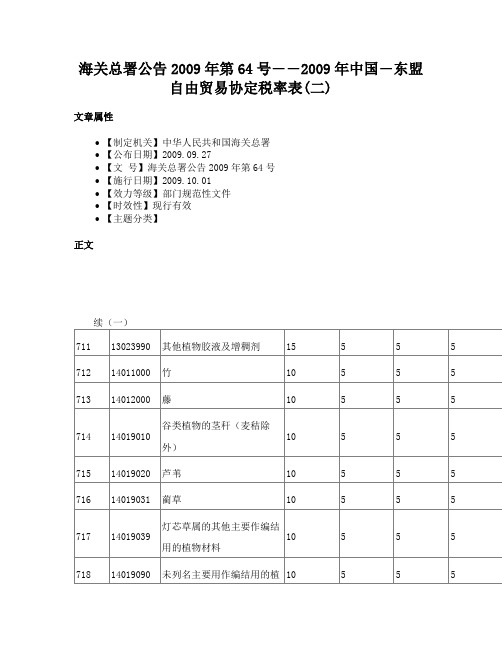
753
15159090
其他固定植物油、脂及其分离品
20
5
5
5
754
15161000
氢化、酯化或反油酸化动物油、脂及其分离品,但未进一步加工的
5
0
755
15162000
氢化、酯化或反油酸化植物油、脂及其分离品,但未进一步加工的
25
5
5
5
756
15171000
人造黄油,非液态
30
5
5
5
757
15179010
海关总署公告2009年第64号――2009年中国―东盟自由贸易协定税率表(二)
文章属性
【制定机关】中华人民共和国海关总署
【公布日期】2009.09.27
【文 号】海关总署公告2009年第64号
【施行日期】2009.10.01
【效力等级】部门规范性文件
【时效性】现行有效
【主题分类】
正文
续(一)
711
13023990
25
5
5
5
888
20059910
清水马蹄罐头
25
5
5
5
889
20059920
蚕豆罐头
25
5
5
5
890
20059940
榨菜
25
5
5
5
891
20059950
咸蕨菜
25
5
5
5
892
20059960
咸荞头
25
10
5
5
5
736
15121100
初榨葵花油或红花油的分离品
9
海关总署公告2009年第37号――中国-东盟自贸区2007年协定税率表(菲律宾)(一)

海关总署公告2009年第37号――中国-东盟自贸区2007年协定税率表(菲律宾)(一)
文章属性
•【制定机关】中华人民共和国海关总署
•【公布日期】2009.06.30
•【文号】海关总署公告2009年第37号
•【施行日期】2009.07.01
•【效力等级】部门规范性文件
•【时效性】失效
•【主题分类】
正文
*注:本篇法规已被《海关总署公告2009年第64号――2009年中国―东盟自由贸易协定税率表》(发布日期:2009年9月27日实施日期:2009年10月1日)废止
海关总署公告
(2009年第37号)
根据国务院批准的《2009年关税实施方案》,海关总署于2008年12月30日发布了中华人民共和国海关总署2008年第98号公告,其中规定对原产于包括菲律宾在内的东盟国家的部分税目的商品继续实施2009年中国-东盟自由贸易协定税率。
现经国务院批准,自2009年7月1日起,对原产于菲律宾的部分税目商品实施2007年中国-东盟自由贸易协定税率(详见附件),不再实施2009年中国-东盟自由贸易协定税率。
《中国-东盟自贸区2007年协定税率表(菲律宾)》使用了简化的商品名称,其范围与2009年《中华人民共和国进出口税则》中相应税号的货品一致。
本公告内容自2009年7月1日起执行。
附件:中国-东盟自贸区2007年协定税率表(菲律宾)
二○○九年六月三十日附件:
中国-东盟自贸区2007年协定税率表(菲律宾)。
中国与东盟投资协定(英文)20090817113007764

AGREEMENT ON INVESTMENT OF THE FRAMEWORK AGREEMENT ON COMPREHENSIVE ECONOMIC CO-OPERATION BETWEEN THE PEOPLE’S REPUBLIC OF CHINA AND THE ASSOCIATION OF SOUTHEAST ASIANNATIONSThe Government of the People’s Republic of China (“China”) and the Governments of Brunei Darussalam, the Kingdom of Cambodia (“Cambodia”), the Republic of Indonesia (“Indonesia”), the Lao People’s Democratic Republic (“Lao PDR”), Malaysia, the Union of Myanmar (“Myanmar”), the Republic of the Philippines (“Philippines”), the Republic of Singapore, the Kingdom of Thailand (“Thailand”) and the Socialist Republic of Viet Nam (“Viet Nam”), Member States of the Association of Southeast Asian Nations (collectively, “ASEAN”or “ASEAN Member States”, or individually, “ASEAN Member State”);RECALLING the Framework Agreement on Comprehensive Economic Co-operation (“the Framework Agreement”) between China and ASEAN (collectively, “the Parties”, or individually referring to China or to an ASEAN Member State as a “Party”) signed by the Heads of Government/State of China and ASEAN Member States in Phnom Penh, Cambodia on the 4th day of November 2002;RECALLING further Article 5 and Article 8 of the Framework Agreement, where in order to establish a China-ASEAN Free Trade Area and to promote investments and create a liberal, facilitative, transparent and competitive investment regime, the Parties agreed to negotiate and conclude as expeditiously as possible an investment agreement in order to progressively liberalise the investment regime, strengthen co-operation in investment, facilitate investment and improvetransparency of investment rules and regulations, and provide for the protection of investments;NOTING that the Framework Agreement recognised the different stages and pace of development among the Parties and the need for special and differential treatment and flexibility for the newer ASEAN Member States of Cambodia, Lao PDR, Myanmar and Viet Nam;REAFFIRMING the Parties’commitment to establish the China-ASEAN Free Trade Area within the specified timeframes, while allowing flexibility to the Parties to address their sensitive areas as provided in the Framework Agreement, in the realisation of the sustainable economic growth and development goals on the basis of equality and mutual benefits so as to achieve a win-win outcome; REAFFIRMING further the rights, obligations and undertakings of each Party under the World Trade Organization (“WTO”), and other multilateral, regional and bilateral agreements and arrangements,HAVE AGREED AS FOLLOWS:Article 1Definitions1. For the purpose of this Agreement:(a)“AEM” means ASEAN Economic Ministers;(b) “freely usable currency”means any currencydesignated as such by the International MonetaryFund (“IMF”) under its Articles of Agreement andany amendments thereto;(c) “GATS” means the General Agreement on Tradein Services in Annex 1B to the WTO Agreement;(d) “investment” means every kind of asset investedby the investors of a Party in accordance with therelevant laws, regulations and policies1 ofanother Party in the territory of the latter including,but not limited to, the following:(i) movable and immovable property and anyother property rights such as mortgages,liens or pledges;(ii) shares, stocks and debentures of juridicalpersons or interests in the property of suchjuridical persons;(iii) intellectual property rights, including rightswith respect to copyrights, patents andutility models, industrial designs,trademarks and service marks,geographical indications, layout designs ofintegrated circuits, trade names, tradesecrets, technical processes, know-howand goodwill;(iv) business concessions2 conferred by law, orunder contract, including concessions tosearch for, cultivate, extract, or exploitnatural resources; and(v) claims to money or to any performancehaving financial value.1For greater certainty, policies shall refer to those affecting investment that are endorsed and announced by the Government of a Party, and made publicly available in a written form.2Business concessions include contractual rights such as those under turnkey, construction or management contracts, production or revenue sharing contracts, concessions, or other similar contracts and can include investment funds for projects such as Build-Operate and Transfer (BOT) and Build-Operate and Own (BOO) schemes.For the purpose of the definition of investment inthis Sub-paragraph, returns that are investedshould be treated as investments and anyalteration of the form in which assets areinvested or reinvested shall not affect theircharacter as investments;(e) “investor of a Party” means a natural person of aParty or a juridical person of a Party that ismaking3 or has made an investment in theterritories of the other Parties;(f) “juridical person of a Party”means any legalentity duly constituted or otherwise organisedunder the applicable law of a Party, whether forprofit or otherwise, and whether privately-ownedor governmentally-owned, and engaged insubstantive business operations in the territory ofthat Party, including any corporation, trust,partnership, joint venture, sole proprietorship orassociation;(g) “measure”means any law, regulation, rule,procedure, or decision or administrative action ofgeneral application, affecting investors and/orinvestments,taken by a Party including its:(i) central, regional or local governments andauthorities; and(ii) non-governmental bodies in the exercise ofpowers delegated by central, regional orlocal governments and authorities;(h) “MOFCOM” means Ministry of Commerce of thePeople’s Republic of China;3For greater certainty, the phrase “is making”shall refer only to Article 5 (Most-Favoured-Nation Treatment) and Article 10 (Transfers and Repatriation of Profits).(i) “natural person of a Party”means any naturalperson possessing the nationality or citizenshipof, or right of permanent residence in the Party inaccordance with its laws and regulations;4 (j) “returns”mean amounts yielded by or derived from an investment particularly, though notexclusively, profits, interests, capital gains,dividends, royalties or fees;(k) “SEOM”means ASEAN Senior Economic Officials Meetings;(l) “WTO Agreement”means the Marrakesh Agreement Establishing the World TradeOrganization, done at Marrakesh, Morocco onthe 15th of April 1994, as may be amended.2. The definitions of each of the above terms shall applyunless the context otherwise requires, or where a Party has specifically defined any of the above terms for application to its commitments or reservations.4In the case of Indonesia, Lao PDR, Myanmar, Thailand and Viet Nam, which do not grant rights of permanent residence to foreigners or do not accord its permanent residents the same benefits as its nationals or citizens, they shall not be legally obliged to accord the benefits of this Agreement to permanent residents of any of the other Parties, or claim the aforesaid benefits for its permanent residents, if applicable, from any of the other Parties.In the case of China, until such time when China enacts its domestic law on the treatment of permanent residents of foreign countries, the permanent residents of the other Parties shall, provided there is reciprocity from those other Parties, be treated no less favourably than those of third countries, in like circumstances, if such permanent residents waive their rights that may be derived from provisions of dispute resolution under any other investment agreements or arrangements concluded between China and any third country.3. In this Agreement, all words used in the singular shallinclude the plural, and all words in the plural shall include the singular, unless the context otherwise requires.Article 2ObjectivesThe objectives of this Agreement are to promote investment flows and to create a liberal, facilitative, transparent and competitive investment regime in China and ASEAN through the following:(a) progressively liberalising the investment regimesof China and ASEAN;(b) creating favourable conditions for the investmentby the investor of a Party in the territory ofanother Party;(c) promoting the cooperation between a Party andthe investor who has investment in the territory ofthat Party on a mutually beneficial basis;(d) encouraging and promoting the flow ofinvestment among the Parties and cooperationamong the Parties on investment-related matters;(e) improving the transparency of investment rulesconducive to increased investment flows amongthe Parties; and(f) providing for the protection of investments inChina and ASEAN.Article 3Scope of Application1. This Agreement shall apply to measures adopted ormaintained by a Party relating to:(a) investors of another Party; and(b) investments of investors of another Party in itsterritory, which shall be:(i) in respect of China, the entire customsterritory according to the WTO definition atthe time of her accession to the WTO onthe 11th day of December 2001. For thispurpose, for China, “territory”in thisAgreement refers to the customs territory ofChina; and(ii) in respect of ASEAN Member States, theirrespective territories.2. Unless otherwise provided in this Agreement, thisAgreement shall apply to all investments made by investors of a Party in the territory of another Party, whether made before or after the entry into force of this Agreement. For greater certainty, the provisions of this Agreement do not bind any Party in relation to any act or fact that took place or any situation that ceased to exist before the date of entry into force of this Agreement.3. In the case of Thailand, this Agreement shall apply onlyin cases where the investment by an investor of another Party in the territory of Thailand has been admitted, and specifically approved in writing forprotection by its competent authorities,5 in accordance with its domestic laws, regulations and policies.4. This Agreement shall not apply to:(a) any taxation measure. This Sub-paragraph shallnot undermine the Parties’ rights and obligationswith respect to taxation measures:(i) where corresponding rights or obligationsare also granted or imposed under theWTO Agreement;(ii) under Article 8 (Expropriation) and Article10 (Transfers and Repatriation of Profits);(iii) under Article 14 (Investment Disputesbetween a Party and an Investor), onlywhen the dispute arises from Article 8(Expropriation); and(iv) under any tax convention relating to theavoidance of double taxation;(b) laws, regulations, policies or procedures ofgeneral application governing the procurementby government agencies of goods and servicespurchased for governmental purposes(government procurement) and not with a view tocommercial resale or with a view to use in theproduction of goods or the supply of services forcommercial sale;(c) subsidies or grants provided by a Party or to anyconditions attached to the receipt or thecontinued receipt of such subsidies or grants,5The name and contact details of the competent authorities responsible for granting such approval shall be informed to the other Parties through the ASEAN Secretariat.whether or not such subsidies or grants areoffered exclusively to domestic investors andinvestments;(d) services supplied in the exercise of governmentalauthority by the relevant body or authority of aParty. For the purposes of this Agreement, aservice supplied in the exercise of governmentalauthority means any service which is suppliedneither on a commercial basis nor in competitionwith one or more service suppliers; and(e) measures adopted or maintained by a Partyaffecting trade in services.5. Notwithstanding Sub-paragraph 4(e), Article 7(Treatment of Investment), Article 8 (Expropriation), Article 9 (Compensation for Losses), Article 10 (Transfers and Repatriation of Profits), Article 12 (Subrogation) and Article 14 (Investment Disputes between a Party and an Investor) shall apply, mutatis mutandis,to any measure affecting the supply of a service by a service supplier of a Party through commercial presence in the territory of another Party, but only to the extent that they relate to an investment and an obligation under this Agreement, regardless of whether or not such a service sector is scheduled in the Party’s Schedule of Specific Commitments made under the Agreement on Trade in Services of the Framework Agreement on Comprehensive Economic Co-operation between the People’s Republic of China and the Association of Southeast Asian Nations signed in Cebu, Philippines on the 14th day of January 2007.Article 4National TreatmentEach Party shall, in its territory, accord to investors of another Party and their investments treatment no less favourable than it accords, in like circumstances, to its own investors and their investments with respect to management, conduct, operation, maintenance, use, sale, liquidation, or other forms of disposal of such investments.Article 5Most-Favoured-Nation Treatment1. Each Party shall accord to investors of another Partyand their investments treatment no less favourablethan that it accords, in like circumstances, to investorsof any other Party or third country and/or theirrespective investments with respect to admission,establishment, acquisition, expansion, management,conduct, operation, maintenance, use, liquidation, sale,and other forms of disposal of investments. 2.Notwithstanding Paragraph 1, if a Party accords more favourable treatment to investors of another Party orthird country and their investments by virtue of anyfuture agreements or arrangements to which that Partyis a party, it shall not be obliged to accord suchtreatment to investors of another Party and theirinvestments. However, upon request from anotherParty, it shall accord adequate opportunity to negotiatethe benefits granted therein.3. The treatment, as set forth in Paragraph 1 andParagraph 2, shall not include:(a) any preferential treatment accorded to investorsand their investments under any existing bilateral,regional or international agreements, or anyforms of economic or regional cooperation withany non-Party; and(b) any existing or future preferential treatmentaccorded to investors and their investments inany agreement or arrangement between oramong ASEAN Member States or between anyParty and its separate customs territories.4. For greater certainty, the obligation in this Article doesnot encompass a requirement for a Party to extend to investors of another Party dispute resolution procedures other than those set out in this Agreement.Article 6Non-Conforming Measures1. Article 4 (National Treatment) and Article 5 (Most-Favoured-Nation Treatment) shall not apply to:(a) any existing or new non-conforming measuresmaintained or adopted within its territory;(b) the continuation or amendment of any non-conforming measures referred to in Sub-paragraph (a).2. The Parties will endeavour to progressively remove thenon-conforming measures.3. The Parties shall enter into discussions pursuant toArticle 24 (Review) with a view to furthering the objectives in Article 2(a) and Article 2(e). The Parties will endeavour to achieve the objectives to be overseen by the institution under Article 22 (Institutional Arrangement).Article 7Treatment of Investment1.Each Party shall accord to investments of investors ofanother Party fair and equitable treatment and full protection and security.2. For greater certainty:(a) fair and equitable treatment refers to theobligation of each Party not to deny justice in anylegal or administrative proceedings; and(b) full protection and security requires each Party totake such measures as may be reasonablynecessary to ensure the protection and securityof the investment of investors of another Party. 3. A determination that there has been a breach ofanother provision of this Agreement, or of a separate international agreement, shall not establish that there has been a breach of this Article.Article 8Expropriation1. A Party shall not expropriate, nationalise or take othersimilar measures (“expropriation”) against investments of investors of another Party, unless the following conditions are met:(a) for a public purpose;(b) in accordance with applicable domestic laws,including legal procedures;(c) carried out in a non-discriminatory manner; and(d) on payment of compensation in accordance withParagraph 2.2. Such compensation shall amount to the fair marketvalue of the expropriated investment at the time when expropriation was publicly announced or when expropriation occurred, whichever is earlier, and it shall be freely transferable in freely usable currencies from the host country. The fair market value shall not reflect any change in market value occurring because the expropriation had become publicly known earlier.3.The compensation shall be settled and paid withoutunreasonable delay. In the event of delay, the compensation shall include interest at the prevailing commercial interest rate from the date of expropriation until the date of payment6. The compensation, including any accrued interest, shall be payable either in the currency in which the investment was originally made or, if requested by the investor, in a freely usable currency.4. Notwithstanding Paragraph 1, Paragraph 2 andParagraph 3, any measure of expropriation relating to land shall be as defined in the expropriating Party’s existing domestic laws and regulations and any amendments thereto, and shall be for the purposes of and upon payment of compensation in accordance with the aforesaid laws and regulations.5. Where a Party expropriates the assets of a juridicalperson which is incorporated or constituted under its laws and regulations, and in which investors of another6For Malaysia, Myanmar, Philippines, Thailand and Viet Nam, in the event of delay, the rate and payment of interest of compensation for expropriation of investments of investors of another Party shall be determined in accordance with their laws, regulations and policies provided that such laws, regulations and policies are applied on a non-discriminatory basis to investments of investors of another Party or a non-Party.Party own shares, it shall apply the provisions of the preceding Paragraphs so as to ensure that compensation is paid to such investors to the extent of their interest in the assets expropriated.6. This Article shall not apply to the issuance ofcompulsory licences granted to intellectual property rights in accordance with the Agreement on Trade-Related Aspects of Intellectual Property Rights in Annex 1C to the WTO Agreement.Article 9Compensation for LossesInvestors of a Party whose investments in the territory of another Party suffer losses owing to war or other armed conflict, revolution, a state of emergency, revolt, insurrection or riot in the territory of the latter Party shall be accorded by the latter Party treatment, as regard restitution, indemnification, compensation or other settlement, no less favourable than that which the latter Party accords, in like circumstances, to investors of any third country or its own nationals, whichever is more favourable.Article 10Transfers and Repatriation of Profits1. Each Party shall allow all transfers in respect ofinvestments in its territory of an investor of any other Party to be made in any freely usable currency at the prevailing market rate of exchange on the date of transfer, and allow such transfers to be freely transferred into and out of its territory without delay.Such transfers shall include:(a) the initial capital, plus any additional capital usedto maintain or expand the investments7;(b) net profits, capital gains, dividends, royalties,licence fees, technical assistance and technicaland management fees, interest and other currentincome accruing from any investment of theinvestors of any other Party;(c) proceeds from the total or partial sale orliquidation of any investment made by investorsof any other Party;(d) funds in repayment of borrowings or loans givenby investors of a Party to the investors of anyother Party which the respective Parties haverecognised as investment;(e) net earnings and other compensations of naturalpersons of any other Party, who are employedand allowed to work in connection with aninvestment in its territory;(f) payments made under a contract entered into bythe investors of any other Party, or theirinvestments including payments made pursuantto a loan transaction; and(g) payments made pursuant to Article 8(Expropriation) and Article 9 (Compensation forLosses).7The Parties understand that the reference to “the initial capital, plus any additional capital used to maintain or expand the investments”only applies following the successful completion of the approval procedures for inward investment.2. Each Party undertakes to accord to the transferreferred to in Paragraph 1, treatment as favourable as that accorded, in like circumstances, to the transfer originating from investments made by investors of any other Party or third country.3. Notwithstanding Paragraph 1 and Paragraph 2, a Partymay prevent or delay a transfer through the equitable, non-discriminatory and good faith application of its laws and regulations relating to:(a) bankruptcy, loss of ability or capacity to makepayments, or protection of the right of creditors;(b) non-fulfilment of the host Party’s transferrequirements in respect of trading or dealing insecurities, futures, options or derivatives;(c) non-fulfilment of tax obligations;(d) criminal or penal offences and the recovery of theproceeds of crime;(e) social security, public retirement or compulsorysaving schemes;(f) compliance with judgements in judicial oradministrative proceedings;(g) workers’retrenchment benefits in relation tolabour compensation relating to, amongst others,foreign investment projects that are closed down;and(h) financial reporting or record keeping of transferswhen necessary to assist law enforcement orfinancial regulatory authorities.4. For greater certainty, the transfers referred to in thepreceding Paragraphs shall comply with relevant formalities stipulated by the host Party’s domestic laws and regulations relating to exchange administration, insofar as such laws and regulations are not to be used as a means of avoiding a Party’s obligations under this Agreement.5. Nothing in this Agreement shall affect the rights andobligations of the Parties as members of the IMF under the Articles of Agreement of the IMF, including the use of exchange actions which are in conformity with the Articles of Agreement of the IMF, provided that a Party shall not impose restrictions on any capital transactions inconsistently with its specific commitments under this Agreement regarding such transactions, except:(a) under Article 11 (Measures to Safeguard theBalance of Payments); or(b) at the request of the IMF; or(c) where, in exceptional circumstances, movementsof capital cause, or threaten to cause, seriouseconomic or financial disturbance in the Partyconcerned, provided such restrictions do notaffect the rights and obligations of the Parties asmembers of the WTO under Paragraph 1 ofArticle XI of GATS, and the measures are takenin accordance with paragraph 2 of Article 11 ofthis Agreement, mutatis mutandis.Article 11Measures to Safeguard the Balance of Payments1. In the event of serious balance of payments andexternal financial difficulties or threat thereof, a Party may adopt or maintain restrictions on investments, including payments or transfers related to suchinvestments. It is recognised that particular pressures on the balance of payments of a Party in the process of economic development may necessitate the use of restrictions to ensure, inter alia, the maintenance of a level of financial reserves adequate for the implementation of its programme of economic development.2. The restrictions referred to in Paragraph 1 shall:(a) be consistent with the Articles of Agreement ofthe IMF;(b) not discriminate among the Parties;(c) avoid unnecessary damage to the commercial,economic and financial interests of any otherParty;(d) not exceed those necessary to deal with thecircumstances described in Paragraph 1;(e) be temporary and be phased out progressivelyas the situation specified in Paragraph 1improves; and(f) be applied such that any other Party is treated noless favourably than any third country.3. Any restrictions adopted or maintained by a Partyunder Paragraph 1 or any changes therein, shall be promptly notified to the other Parties.Article 12Subrogation1. In the event that any Party or any agency, institution,statutory body or corporation designated by it, as a result of an indemnity it has given in respect of aninvestment or any part thereof, makes payment to its own investors in respect of any of their claims under this Agreement, the other Parties concerned shall acknowledge that the former Party or any agency, institution, statutory body or corporation designated by it is entitled by virtue of subrogation to exercise the rights and assert the claims of its own investors. The subrogated rights or claims shall not be greater than the original rights or claims of the said investor.2. Where a Party or any agency, institution, statutorybody or corporation designated by it has made a payment to an investor of that Party and has taken over the rights and claims of the investor, that investor shall not, unless authorised to act on behalf of the Party or the agency, institution, statutory body or corporation designated by it making the payment, pursue those rights and claims against the other Party.Article 13Dispute Between PartiesThe provisions of the Agreement on Dispute Settlement Mechanism of the Framework Agreement on Comprehensive Economic Co-operation between the People’s Republic of China and the Association of Southeast Asian Nations signed in Vientiane, Lao PDR on the 29th day of November 2004 shall apply to the settlement of disputes between or amongst the Parties under this Agreement.Article 14Investment Disputes between a Party and an Investor1. This Article shall apply to investment disputes betweena Party and an investor of another Party concerning analleged breach of an obligation of the former Party under Article 4 (National Treatment), Article 5 (Most-Favoured-Nation Treatment), Article 7 (Treatment of Investment), Article 8 (Expropriation), Article 9(Compensation for Losses) and Article 10 (Transfers and Repatriation of Profits), which causes loss or damage to the investor in relation to its investment with respect to the management, conduct, operation, or sale or other disposition of an investment.2. This Article shall not apply:(a) to investment disputes arising out of eventswhich occurred, or to investment disputes whichhad been settled, or which were already underjudicial or arbitral process, prior to the entry intoforce of this Agreement;(b) in cases where the disputing investor holds thenationality or citizenship of the disputing Party. 3. The parties to the dispute shall, as far as possible,resolve the dispute through consultations.4. Where the dispute cannot be resolved as provided forunder Paragraph 3 within six (6) months from the date of written request for consultations and negotiations, unless the parties to the dispute agree otherwise, it may be submitted at the choice of the investor:(a) to the courts or administrative tribunals of thedisputing Party, provided such courts oradministrative tribunals have jurisdiction; or(b) under the International Centre for Settlement ofInvestment Disputes (ICSID) Convention and theICSID Rules of Procedure for ArbitrationProceedings8, provided that both the disputingParty and the non-disputing Party are parties tothe ICSID Convention; or8In the case of Philippines, submission of a claim under the ICSID Convention and the ICSID Rules of Procedure for Arbitration Proceedings shall be subject to a written agreement between the disputing parties in the event that an investment dispute arises.。
中国和东盟签署《投资协议》
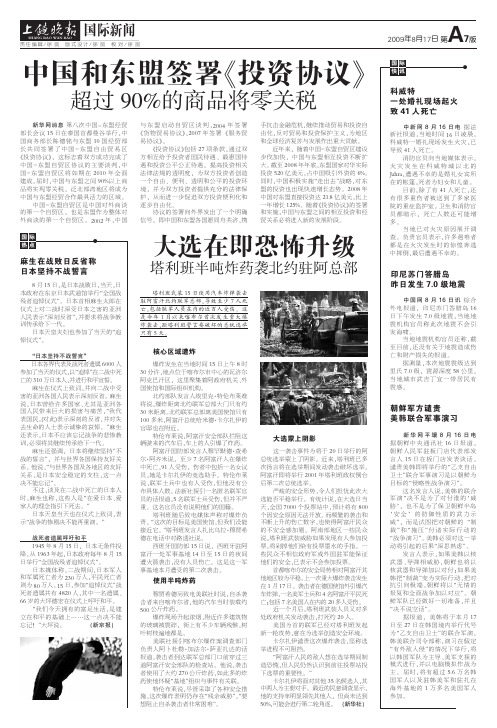
当地已对火灾原因展开调 查。 负责官员表示,许多遇难者 都是在火灾发生时的惊惶奔逃 中摔倒,最后遭遇不幸的。
印尼苏门答腊岛 昨日发生 7.0 级地震
中 国 网 8 月 16 日 讯 综 合 外 电 报 道 , 印 尼 苏 门 答 腊 岛 16 日 下 午 发 生 7.0 级 地 震 ,当 地 地 震机构官员称此次地震不会引 发海啸。
当地地震机构官员还称,截 至目前,还没有关于地震造成伤 亡和财产损失的报道。
据测量,本次地震震级达到 里氏 7.0 级, 震源深度 58 公里, 当地城市武吉丁宜一带居民有 震感。
朝鲜军方谴责 美韩联合军事演习
新 华 网 平 壤 8 月 16 日 电 据 朝 鲜 中 央 通 讯 社 16 日 报 道 , 朝鲜人民军驻板门店代表部发 言 人 15 日 在 板 门 店 发 表 谈 话 , 谴责美韩即将举行的“乙支自由 卫士”联合军事演习是以朝鲜为 目标的“侵略性战争演习”。
66 岁的大坪德宏在仪式上呼吁和平。
“我们今天拥有的富足生活,是建
立在和平的基础上……这一点决不能
忘记! ”大坪说。
(新京报)
大选在即恐怖升级
塔利班半吨炸药袭北约驻阿总部
塔利班武装 15 日使用汽车炸弹袭击 驻阿富汗北约联军总部,导致至少 7 人死 亡,包括联军人员在内的近百人受伤。 这 是今年 1 月以来喀布尔首次发生重大爆 炸袭击,距塔利班誓言要破坏的总统选举 只有 5 天。
协议的签署向外界发出了一个明确 信号, 即中国和东盟各国愿同舟共济,携
手抗击金融危机,继续推动贸易和投资自 由化,反对贸易和投资保护主义,为地区 和全球经济复苏与发展作出重大贡献。
中国东盟自由贸易协定内容
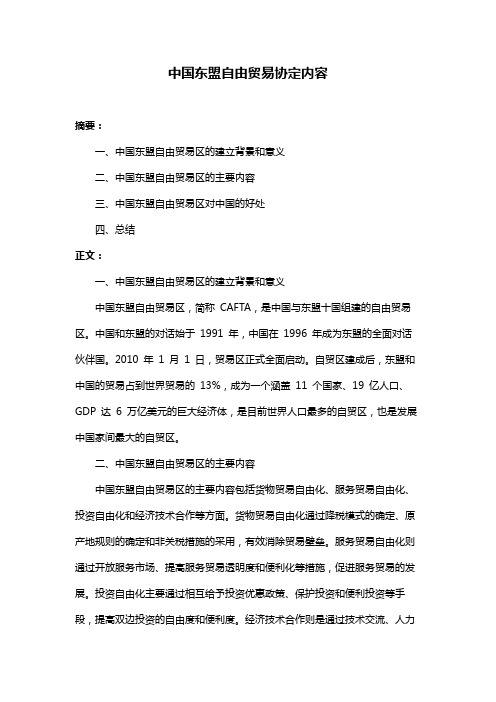
中国东盟自由贸易协定内容摘要:一、中国东盟自由贸易区的建立背景和意义二、中国东盟自由贸易区的主要内容三、中国东盟自由贸易区对中国的好处四、总结正文:一、中国东盟自由贸易区的建立背景和意义中国东盟自由贸易区,简称CAFTA,是中国与东盟十国组建的自由贸易区。
中国和东盟的对话始于1991 年,中国在1996 年成为东盟的全面对话伙伴国。
2010 年1 月1 日,贸易区正式全面启动。
自贸区建成后,东盟和中国的贸易占到世界贸易的13%,成为一个涵盖11 个国家、19 亿人口、GDP 达6 万亿美元的巨大经济体,是目前世界人口最多的自贸区,也是发展中国家间最大的自贸区。
二、中国东盟自由贸易区的主要内容中国东盟自由贸易区的主要内容包括货物贸易自由化、服务贸易自由化、投资自由化和经济技术合作等方面。
货物贸易自由化通过降税模式的确定、原产地规则的确定和非关税措施的采用,有效消除贸易壁垒。
服务贸易自由化则通过开放服务市场、提高服务贸易透明度和便利化等措施,促进服务贸易的发展。
投资自由化主要通过相互给予投资优惠政策、保护投资和便利投资等手段,提高双边投资的自由度和便利度。
经济技术合作则是通过技术交流、人力资源开发和基础设施建设等方式,提升双方的经济发展水平。
三、中国东盟自由贸易区对中国的好处中国东盟自由贸易区对中国的好处主要体现在以下几个方面:1.推动中国与东盟国家的贸易往来,拓宽出口市场,增加贸易额,促进经济发展。
2.提高中国与东盟国家的投资合作水平,促进国内产业升级和技术进步。
3.通过经济技术合作,提升中国与东盟国家的基础设施建设和人力资源开发水平,为双边经济发展提供有力支撑。
4.有助于中国在东盟地区建立更加紧密的经济联系,提升中国在国际经济舞台上的地位和影响力。
四、总结综上所述,中国东盟自由贸易区对于推动中国与东盟国家的经济合作具有重要意义。
通过货物贸易自由化、服务贸易自由化、投资自由化和经济技术合作等方面的措施,不仅有助于提升双边贸易和投资水平,还可以促进双方的经济发展和技术进步。
中国与东盟国家双向投资关系分析及对策研究
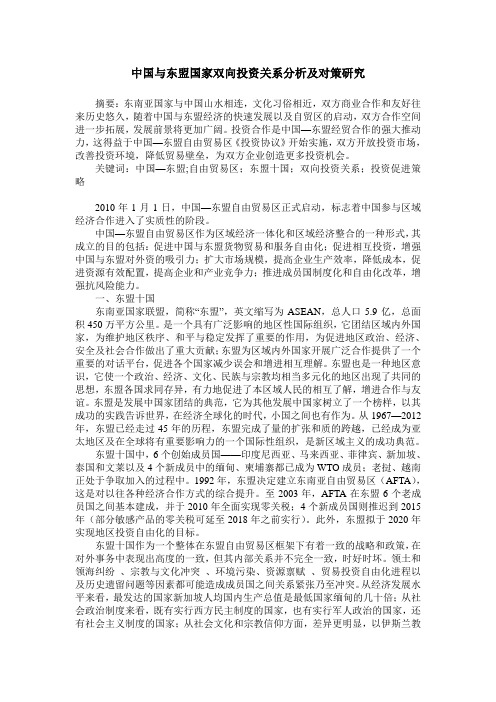
中国与东盟国家双向投资关系分析及对策研究摘要:东南亚国家与中国山水相连,文化习俗相近,双方商业合作和友好往来历史悠久,随着中国与东盟经济的快速发展以及自贸区的启动,双方合作空间进一步拓展,发展前景将更加广阔。
投资合作是中国—东盟经贸合作的强大推动力,这得益于中国—东盟自由贸易区《投资协议》开始实施,双方开放投资市场,改善投资环境,降低贸易壁垒,为双方企业创造更多投资机会。
关键词:中国—东盟;自由贸易区;东盟十国;双向投资关系;投资促进策略2010年1月1日,中国—东盟自由贸易区正式启动,标志着中国参与区域经济合作进入了实质性的阶段。
中国—东盟自由贸易区作为区域经济一体化和区域经济整合的一种形式,其成立的目的包括:促进中国与东盟货物贸易和服务自由化;促进相互投资,增强中国与东盟对外资的吸引力;扩大市场规模,提高企业生产效率,降低成本,促进资源有效配置,提高企业和产业竞争力;推进成员国制度化和自由化改革,增强抗风险能力。
一、东盟十国东南亚国家联盟,简称“东盟”,英文缩写为ASEAN,总人口5.9亿,总面积450万平方公里。
是一个具有广泛影响的地区性国际组织,它团结区域内外国家,为维护地区秩序、和平与稳定发挥了重要的作用,为促进地区政治、经济、安全及社会合作做出了重大贡献;东盟为区域内外国家开展广泛合作提供了一个重要的对话平台,促进各个国家减少误会和增进相互理解。
东盟也是一种地区意识,它使一个政治、经济、文化、民族与宗教均相当多元化的地区出现了共同的思想,东盟各国求同存异,有力地促进了本区域人民的相互了解,增进合作与友谊。
东盟是发展中国家团结的典范,它为其他发展中国家树立了一个榜样,以其成功的实践告诉世界,在经济全球化的时代,小国之间也有作为。
从1967—2012年,东盟已经走过45年的历程,东盟完成了量的扩张和质的跨越,已经成为亚太地区及在全球将有重要影响力的一个国际性组织,是新区域主义的成功典范。
中华人民共和国政府与东南亚国家联盟成员国政府 全面经济合作框架协议投资协议
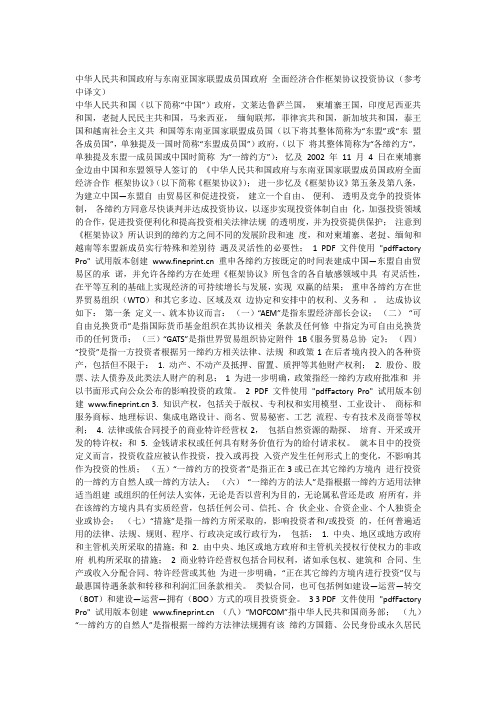
中华人民共和国政府与东南亚国家联盟成员国政府全面经济合作框架协议投资协议(参考中译文)中华人民共和国(以下简称“中国”)政府,文莱达鲁萨兰国,柬埔寨王国,印度尼西亚共和国,老挝人民民主共和国,马来西亚,缅甸联邦,菲律宾共和国,新加坡共和国,泰王国和越南社会主义共和国等东南亚国家联盟成员国(以下将其整体简称为“东盟”或“东盟各成员国”,单独提及一国时简称“东盟成员国”)政府,(以下将其整体简称为“各缔约方”,单独提及东盟一成员国或中国时简称为“一缔约方”):忆及2002 年11 月4 日在柬埔寨金边由中国和东盟领导人签订的《中华人民共和国政府与东南亚国家联盟成员国政府全面经济合作框架协议》(以下简称《框架协议》);进一步忆及《框架协议》第五条及第八条,为建立中国—东盟自由贸易区和促进投资,建立一个自由、便利、透明及竞争的投资体制,各缔约方同意尽快谈判并达成投资协议,以逐步实现投资体制自由化,加强投资领域的合作,促进投资便利化和提高投资相关法律法规的透明度,并为投资提供保护;注意到《框架协议》所认识到的缔约方之间不同的发展阶段和速度,和对柬埔寨、老挝、缅甸和越南等东盟新成员实行特殊和差别待遇及灵活性的必要性; 1 PDF 文件使用"pdfFactory Pro" 试用版本创建 重申各缔约方按既定的时间表建成中国—东盟自由贸易区的承诺,并允许各缔约方在处理《框架协议》所包含的各自敏感领域中具有灵活性,在平等互利的基础上实现经济的可持续增长与发展,实现双赢的结果;重申各缔约方在世界贸易组织(WTO)和其它多边、区域及双边协定和安排中的权利、义务和。
达成协议如下:第一条定义一、就本协议而言:(一)“AEM”是指东盟经济部长会议;(二)“可自由兑换货币”是指国际货币基金组织在其协议相关条款及任何修中指定为可自由兑换货币的任何货币;(三)“GATS”是指世界贸易组织协定附件1B《服务贸易总协定》;(四)“投资”是指一方投资者根据另一缔约方相关法律、法规和政策1在后者境内投入的各种资产,包括但不限于:1. 动产、不动产及抵押、留置、质押等其他财产权利; 2. 股份、股票、法人债券及此类法人财产的利息;1 为进一步明确,政策指经一缔约方政府批准和并以书面形式向公众公布的影响投资的政策。
中国东盟自由贸易协定内容

中国东盟自由贸易协定内容(实用版)目录一、中国东盟自由贸易区的建立背景和意义二、中国东盟自由贸易区的主要内容三、中国东盟自由贸易区对中国的好处四、总结正文一、中国东盟自由贸易区的建立背景和意义中国东盟自由贸易区,简称 CAFTA,是中国与东盟十国组建的自由贸易区。
中国和东盟对话始于 1991 年,中国 1996 年成为东盟的全面对话伙伴国。
2010 年 1 月 1 日贸易区正式全面启动。
自贸区建成后,东盟和中国的贸易占到世界贸易的 13%,成为一个涵盖 11 个国家、19 亿人口、GDP 达 6 万亿美元的巨大经济体,是目前世界人口最多的自贸区,也是发展中国家间最大的自贸区。
二、中国东盟自由贸易区的主要内容中国东盟自由贸易区的主要内容包括货物贸易自由化、服务贸易自由化、投资自由化和经济技术合作等方面。
货物贸易自由化通过降税模式的确定、原产地规则的确定和非关税措施的采用,有效消除贸易壁垒。
服务贸易自由化则通过开放服务市场、降低服务贸易准入门槛和建立服务贸易争端解决机制等方式推进。
投资自由化主要体现在放宽投资限制、提高投资便利化程度和保护投资者权益等方面。
经济技术合作则包括贸易和投资便利化、人力资源开发、基础设施建设和科技创新等领域的合作。
三、中国东盟自由贸易区对中国的好处中国东盟自由贸易区对中国的好处主要体现在以下几个方面:1.推动货物和服务贸易的增长。
自由贸易区的建立降低了贸易壁垒,为中国企业进入东盟市场提供了更多机会,同时也扩大了东盟国家对中国市场的出口。
2.提高投资效益。
自由贸易区为中国企业在东盟国家投资提供了更多便利,有助于提高中国企业在东盟国家的投资效益。
3.促进区域经济一体化。
中国东盟自由贸易区的建立有助于推进区域经济一体化进程,为中国和东盟国家共同发展提供更加广阔的空间。
4.提升中国在国际经济舞台上的地位。
中国东盟自由贸易区的建立,使中国在全球经济治理中发挥更加重要的作用,提升了中国在国际经济舞台上的地位。
2009年中国-东盟自由贸易协定税率表(菲律宾、老挝、柬埔寨

63
20
0
0
0
64
18
0
0
0
65 66 67 68
20
5
5
5
1.3元/千克 0.3元/千克 0.3元/千克 0.3元/千克 20 20 5 5 5 5 5 5
69
20
5
5
5
70 71
20 0.6元/千克 0.3元/千克
5
5 0 0.3元/千克
5
72
2071419
73
2071421
74 75 76 77 78 79 80 81 82 83 84 85
0 0 0 0 0 0 0 0 0 0 0 0 0 0 0 0 0 0 0 0 0 5 0 0 0 0 0 0 0
152
10
5
0
0
153
其他冻大马 哈鱼,但鱼 3031900 肝及鱼卵除 外 3032100 冻鳟鱼 冻大西洋鲑 3032210 鱼 冻多瑙哲罗 3032220 鱼 3032900 其他冻鲑鱼 冻格陵兰庸 3033110 鲽鱼 3033190 冻庸鲽鱼 3033200 冻鲽鱼 3033300 冻鳎鱼 其他冻比目 3033900 鱼 冻长鳍金枪 3034100 鱼 冻黄鳍金枪 3034200 鱼 3034300 冻鲣鱼 冻大眼金枪 3034400 鱼,但鱼肝 及鱼卵除外 冻蓝鳍金枪 3034500 鱼,但鱼肝 及鱼卵除外 冻南方蓝鳍 金枪鱼,但 3034600 鱼肝及鱼卵 除外 其他冻金枪 3034900 鱼,但鱼肝 及鱼卵除外 冻鲱鱼(大 西洋鲱鱼、 太平洋鲱 3035100 鱼),但鱼 肝及鱼卵除 外 冻鳕鱼(大 西洋鳕鱼、 太平洋鳕鱼 3035200 、格陵兰鳕 鱼),但鱼 肝及鱼卵除 外 冻剑鱼,但 3036100 鱼肝及鱼卵 除外 冻南极犬牙 3036200 鱼,但鱼肝 及鱼卵除外 冻沙丁鱼、 3037100 黍鲱鱼 3037200 冻黑线鳕鱼 3037300 冻绿青鳕鱼
2002.11中国东盟全面经济合作框架协议

中华人民共和国与东南亚国家联盟全面经济合作框架协议(中文译文)序言我们,中华人民共和国(以下简称"中国")与文莱达鲁萨兰国,柬埔寨王国,印度尼西亚共和国,老挝人民民主共和国,马来西亚,缅甸联邦,菲律宾共和国,新加坡共和国,泰王国和越南社会主义共和国等东南亚国家联盟成员国(以下将其整体简称为"东盟"或"东盟各成员国",单独一国简称"东盟成员国")政府首脑或国家元首:忆及我们2001年11月6日在文莱达鲁萨兰国斯里巴加湾东盟-中国领导人会上关于经济合作框架和在10 年内建立中国-东盟自由贸易区(以下简称"中国-东盟自贸区")的决定,自由贸易区将对柬埔寨、老挝、缅甸和越南等东盟新成员国(以下简称"东盟新成员国")给予特殊和差别待遇及灵活性,并对早期收获做出规定,其涉及的产品及服务清单将通过相互磋商决定;期望通过具有前瞻性的《中国与东盟(以下将其整体简称为"各缔约方",单独提及东盟一成员国或中国时简称为"一缔约方")全面经济合作框架协议》(以下简称"本协议"),以构筑双方在21世纪更紧密的经济联系;期望最大限度地降低壁垒,加深各缔约方之间的经济联系;降低成本;增加区域内贸易与投资;提高经济效率;为各缔约方的工商业创造更大规模的市场,该市场将为商业活动提供更多机会和更大规模的经济容量;以及增强各缔约方对资本和人才的吸引力;确信中国-东盟自贸区的建立将在各缔约方之间创造一种伙伴关系,并为东亚加强合作和维护经济稳定提供一个重要机制;认识到工商部门在加强各缔约方之间的贸易和投资方面的重要作用和贡献,以及进一步推动和便利它们之间的合作并使它们充分利用中国-东盟自贸区带来的更多商业机会的必要性;认识到东盟各成员国之间经济发展阶段的差异和对灵活性的要求,特别是为东盟新成员国更多地参与中国-东盟经济合作提供便利并扩大它们出口增长的需要,这要着重通过加强其国内能力、效率和竞争力来实现;重申各缔约方在世界贸易组织(以下简称为WTO)和其他多边、区域及双边协议与安排中的权利、义务和承诺;认识到区域贸易安排在加快区域和全球贸易自由化方面能够起到的促进作用,以及在多边贸易体制框架中起到的建设性作用。
中国与东盟各国双边投资协定主要内容比较
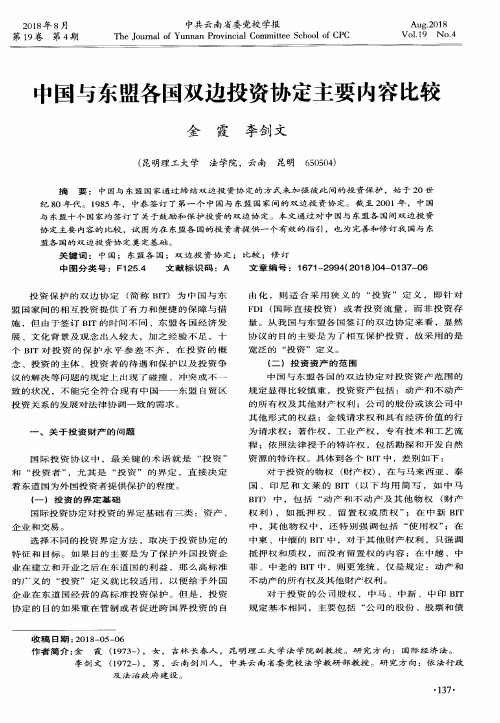
摘 要 : 中 国 与 东盟 国 家 通 过 缔 结 双 边 投 资 协 定 的 方 式 来 加 强 彼 此 间 的 投 资 保 护 ,始 于 20世 纪 80年 代 。 1985年 , 中泰 签 订 了第 一 个 中 国 与 东盟 国 家 间的 双 边 投 资 协 定 。截 至 2001年 , 中 国 与 东盟 十 个 国 家 均 签 订 了 关 于 鼓 励 和 保 护 投 资 的 双 边 协 定 。 本 文 通 过 对 中 国 与 东 盟 各 国 间 双 边 投 资 协 定 主要 内容 的 比较 ,试 图 为在 东盟 各 国的投 资 者提 供 一 个 有 效 的 指 引 ,也 为 完善 和修 订 我 国与 东 盟 各 国 的 双 边 投 资 协 定 奠 定 基 础 。
收 稿 日 期 :2018—05—06 作 者 简 介 :金 霞 (1973一), 女 , 吉 林 长 春 人 , 昆 明 理 工 大 学 法 学 院 副 教 授 。 研 究 方 向 : 国 际 经 济 法 。
关 键 词 : 中 国 ; 东盟 各 国 ; 双 边 投 资 协 定 ; 比较 ;修 订 中 图 分 类 号 : F125.4 文 献 标 识 码 : A 文 章 编 号 : 1671—2994(2018)04—0137-06
投 资 保 护 的 双 边 协 定 (简 称 BIT) 为 中 国 与 东 盟 国 家 间 的 相 互 投 资 提 供 了有 力 和 便 捷 的 保 障 与 措 施 , 但 由 于 签 订 BIT 的 时 间 不 同 、东 盟 各 国 经 济 发 展 、文 化 背 景 及 观 念 出 入 较 大 ,加 之 经 验 不 足 , 十 个 BIT对 投 资 的 保 护 水 平 参 差 不 齐 , 在 投 资 的 概 念 、 投 资 的 主 体 、投 资 者 的 待 遇 和 保 护 以 及 投 资 争 议 的 解 决 等 问 题 的 规 定 上 出 现 了 碰 撞 、 冲 突 或 不 一 致 的 状 况 ,不 能 完 全 符 合 现 有 中 国— — 东 盟 自贸 区 投 资 关 系 的 发 展 对 法 律 协 调 一 致 的 需 求 。
中国和东盟相互投资新进展措施浅析

中国和东盟相互投资新进展措施浅析摘要:深入推动中国与东盟自由贸易区建设,提升中国和东盟国家的合作层次,在良好的贸易合作根底上推动双方的相互投资,优化区域分工格局,促进区域技术进步,调整区域产业结构,提高区域资本配置效率,有效增强区域整体竞争力,对自由贸易区的可持续开展具有深远意义。
关键词:CAFTA;中国-东盟;相互投资经过6年建设,中国-东盟自由贸易区(CAFTA)贸易自由化程度明显提升,中国-东盟双边贸易额已在2021年突破2000亿美元大关。
如果说贸易合作是CAFTA建设的“先导〞,那么投资合作就是CAFTA向深层次开展的“助推器〞。
事实上,在?中国与东盟全面经济合作框架协议?中,相互投资被列入深化中国与东盟五大重点合作的领域之一,并制定了“为中国-东盟投资领域的自由化建立一个自由、便利、透明并具有竞争力的投资机制〞的开展目标。
因此,当前CAFTA建设的重点就在于推动相互之间的直接投资。
一、2021年以前的中国-东盟相互投资回忆由于特殊的地缘优势、文化优势,中国和东盟相互之间的投资(特别是东盟国家对中国的投资)在20世纪80年代就已开始实施,到2021年CAFTA正式启动建设前,双方的相互投资呈现出以下特点:(一)以东盟对华投资为主导,中国对东盟投资规模较小东盟国家对华直接投资最早开始于20世纪80年代中期,但是大规模的对华直接投资那么是在1992年之后。
据统计,1992年之后东盟国家一年的对华投资额就超过了1979-1991年的投资额总和。
1983年东盟国家对华直接投资只有530万美元,1993年就到达了10.1亿美元,10年间增长了近200倍。
1994-1998年间继续快速增长,1998年东南亚国家对华直接投资到达了迄今为止的最高纪录42.2亿美元。
由于受亚洲金融危机影响,1999-2000年东盟国家对华投资出现负增长,1999年实际投资金额大幅下降,比1998年下降了22%,2000年再下降4.4%。
海关总署公告2009年第64号――2009年中国―东盟自由贸易协定税率表(九)
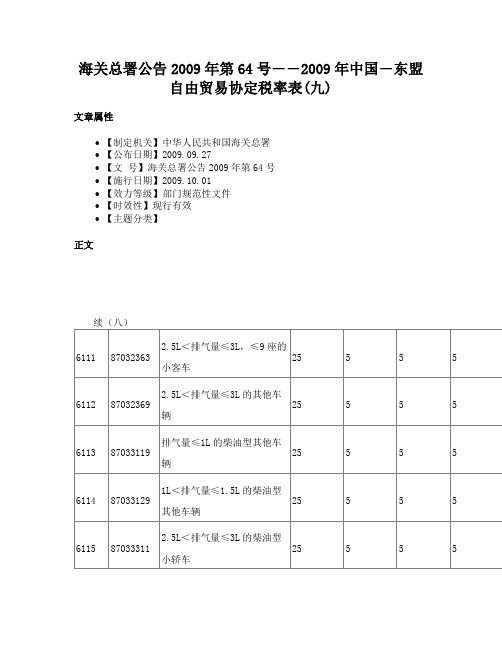
海关总署公告2009年第64号――2009年中国―东盟
自由贸易协定税率表(九)
文章属性
•【制定机关】中华人民共和国海关总署
•【公布日期】2009.09.27
•【文号】海关总署公告2009年第64号
•【施行日期】2009.10.01
•【效力等级】部门规范性文件
•【时效性】现行有效
•【主题分类】
正文
注1:①完税价格不高于2000美元/台:30%;完税价格高于2000美元/台:3%,加4374元
②完税价格不高于2000美元/台:5%;完税价格高于2000美元/台:3%,加324元
③完税价格不高于5000美元/台,35%;完税价格高于5000美元/台:3%,加12960元
④完税价格不高于5000美元/台,5%;完税价格高于5000美元/台:3%,加810元
注2:上述税号以外的其他税号产品的中国东盟自贸区2009年协定税率(菲律宾、老挝、柬埔寨)与2009年最惠国税率相同。
中国-东盟自贸区《投资协议》中文

中华人民共和国政府与东南亚国家联盟成员国政府全面经济合作框架协议投资协议(参考中译文)中华人民共和国(以下简称“中国”)政府,文莱达鲁萨兰国,柬埔寨王国,印度尼西亚共和国,老挝人民民主共和国,马来西亚,缅甸联邦,菲律宾共和国,新加坡共和国,泰王国和越南社会主义共和国等东南亚国家联盟成员国(以下将其整体简称为“东盟”或“东盟各成员国”,单独提及一国时简称“东盟成员国”)政府,(以下将其整体简称为“各缔约方”,单独提及东盟一成员国或中国时简称为“一缔约方”):忆及2002年11月4日在柬埔寨金边由中国和东盟领导人签订的《中华人民共和国政府与东南亚国家联盟成员国政府全面经济合作框架协议》(以下简称《框架协议》);进一步忆及《框架协议》第五条及第八条,为建立中国—东盟自由贸易区和促进投资,建立一个自由、便利、透明及竞争的投资体制,各缔约方同意尽快谈判并达成投资协议,以逐步实现投资体制自由化,加强投资领域的合作,促进投资便利化和提高投资相关法律法规的透明度,并为投资提供保护;注意到《框架协议》所认识到的缔约方之间不同的发展阶段和速度,和对柬埔寨、老挝、缅甸和越南等东盟新成员实行特殊和差别待遇及灵活性的必要性;重申各缔约方按既定的时间表建成中国—东盟自由贸易区的承诺,并允许各缔约方在处理《框架协议》所包含的各自敏感领域中具有灵活性,在平等互利的基础上实现经济的可持续增长与发展,实现双赢的结果;重申各缔约方在世界贸易组织(WTO)和其它多边、区域及双边协定和安排中的权利、义务和责任。
达成协议如下:第一条定义一、就本协议而言:(一)“AEM”是指东盟经济部长会议;(二)“可自由兑换货币”是指国际货币基金组织在其协议相关条款及任何修正案中指定为可自由兑换货币的任何货币;(三)“GATS”是指世界贸易组织协定附件1B《服务贸易总协定》;(四)“投资”是指一方投资者根据另一缔约方相关法律、法规和政策1在后者境内投入的各种资产,包括但不限于:1. 动产、不动产及抵押、留置、质押等其他财产权利;2. 股份、股票、法人债券及此类法人财产的利息;1为进一步明确,政策指经一缔约方政府批准和宣布并以书面形式向公众公布的影响投资的政策。
《中国-东盟全面经济合作框架协议》-详解

《中国-东盟全面经济合作框架协议》-详解(重定向自《中国—东盟全面经济合作框架协议》)目录• 1 《中国-东盟全面经济合作框架协议》的简介• 2 《中国-东盟全面经济合作框架协议》的主要内容《中国-东盟全面经济合作框架协议》的简介2002年11月4日,朱镕基总理和东盟10国领导人共同签署了《中国-东盟全面经济合作框架协议》,这标志着中国与东盟的经贸合作进入了一个新的历史阶段。
《框架协议》是中国-东盟自贸区的法律基础。
根据该《框架协议》,中国-东盟自贸区包括货物贸易、服务贸易、投资和经济合作等内容。
其中货物贸易是自贸区的核心内容,除涉及国家安全、人类健康、公共道德、文化艺术保护等WTO允许例外的产品以及少数敏感产品外,其它全部产品的关税和贸易限制措施都应逐步取消。
按照《框架协议》的规定,中国和东盟双方从2005年起开始正常轨道产品的降税,2010年中国与东盟老成员,即文莱、印度尼西亚、马来西亚、菲律宾、新加坡和泰国,将建成自贸区,2015年和东盟新成员,即越南、老挝、柬埔寨和缅甸,将建成自贸区,届时,中国与东盟的绝大多数产品将实行零关税,取消非关税措施,双方的贸易将实现自由化。
由于越南、老挝、柬埔寨三国尚未加入WTO,我国同意给予这三国以多边最惠国待遇,即我国加入WTO时的承诺也适用于这些国家。
中国-东盟自由贸易区是我国与WTO成员建立的第一个自由贸易区,它将是世界上人口最多的自由贸易区,也将是发展中国家组成的最大的自由贸易区。
《中国-东盟全面经济合作框架协议》的主要内容《框架协议》是中国—东盟自贸区的法律基础,共16个条款,确定了自贸区的基本架构。
主要内容如下:一、中国-东盟自贸区的内容。
中国-东盟自贸区将包括货物贸易、服务贸易、投资和经济合作等内容。
其中货物贸易是自贸区的核心内容,除少数敏感产品外,其它全部产品的关税和贸易限制措施都应逐步取消。
二、谈判时间安排。
货物贸易谈判从2003年初开始,应于2004年6月30日前结束。
中国和东盟签署《投资协议》

中国和东盟签署《投资协议》
佚名
【期刊名称】《大陆桥视野》
【年(卷),期】2009(000)010
【摘要】第八次中国—东盟经贸部长会议近日在泰国首都曼谷举行,中国商务部长陈德铭与东盟10国经贸部长共同签署了中国—东盟自由贸易区《投资协议》,这标志着双方成功完成了中国—东盟自贸区协议的主要谈判,中国—东盟自贸区将如期在2010年全面建成。
【总页数】1页(P20)
【正文语种】中文
【中图分类】F114.46
【相关文献】
1.中国——东盟自贸区《投资协议》签署 [J],
2.中国-东盟自贸区《投资协议》降低摩企东盟投资门槛 [J], 郝娟
3.中国-东盟框架下国际投资法律环境的比较研究——以《中国-东盟投资协议》的签订与生效为背景 [J], 魏艳茹
4.中国联通集团与成都市政府签署中国联通IDC(成都)基地项目投资协议 [J], 罗梁;张吉(图)
5.中国和东盟自由贸易区《投资协议》签署 [J],
因版权原因,仅展示原文概要,查看原文内容请购买。
中欧全面投资协定后续

中欧全面投资协定后续【原创版】目录1.RCEP 自贸协定的签署和中欧投资协定谈判的背景与意义2.RCEP 自贸协定的主要内容与目标3.中欧投资协定谈判的进展与挑战4.我国在推动签署 RCEP 和完成中欧投资协定谈判方面的立场与举措5.落实 RCEP 和中欧投资协定对我国经济发展的影响正文一、RCEP 自贸协定的签署和中欧投资协定谈判的背景与意义2020 年 11 月 12 日,据商务部报道,我国正积极推动年内签署RCEP 自贸协定,并力争完成中欧投资协定谈判。
RCEP(《区域全面经济伙伴关系协定》)是由东盟 10 个国家于 2012 年发起,邀请澳大利亚、中国、印度、日本、韩国、新西兰 6 个国家参加的自贸协定谈判。
此次签署 RCEP 和完成中欧投资协定谈判,对我国深度参与全球经济治理、推动构建开放型世界经济具有重要意义。
二、RCEP 自贸协定的主要内容与目标RCEP 自贸协定的主要内容包括货物贸易、服务贸易、投资、经济技术合作、知识产权、竞争政策、电子商务等章节。
其目标是达成一个现代的、全面的、高质量的、互惠的新的大型自贸协定,降低区域内的贸易和投资壁垒,推动区域经济一体化。
三、中欧投资协定谈判的进展与挑战中欧投资协定谈判自 2013 年启动以来,已经进行了多轮谈判。
双方在市场准入、投资保护、竞争政策等领域取得了积极进展,但仍存在一些挑战,例如在投资争议解决、知识产权保护等方面还需进一步协商。
四、我国在推动签署 RCEP 和完成中欧投资协定谈判方面的立场与举措我国一直积极参与 RCEP 和中欧投资协定谈判,推动区域经济一体化和双边经济合作。
我国在谈判中积极主张开放、包容、平衡的谈判原则,努力维护国家的核心利益和战略利益。
同时,我国也通过制度型开放、落实好中欧地理标志协定等方式,加快形成与国际投资、贸易规则相衔接的基本制度体系和监管模式。
五、落实 RCEP 和中欧投资协定对我国经济发展的影响RCEP 和中欧投资协定的签署和实施,将有助于我国进一步融入全球经济治理体系,提升我国在国际经济舞台上的地位和影响力。
中国-东盟双边合作全记录之二:投资篇
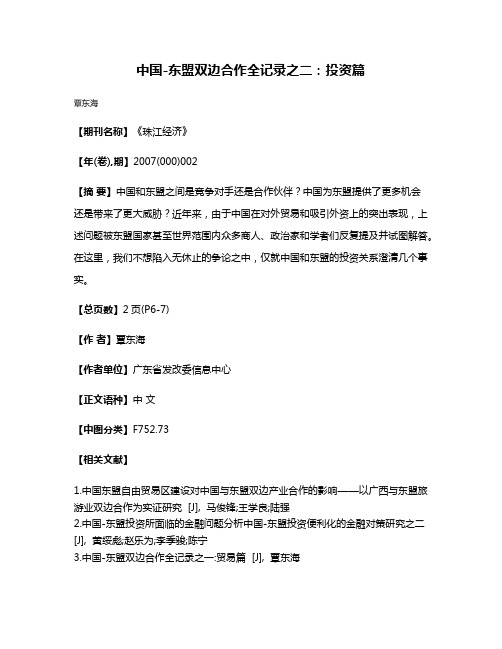
中国-东盟双边合作全记录之二:投资篇
覃东海
【期刊名称】《珠江经济》
【年(卷),期】2007(000)002
【摘要】中国和东盟之间是竞争对手还是合作伙伴?中国为东盟提供了更多机会
还是带来了更大威胁?近年来,由于中国在对外贸易和吸引外资上的突出表现,上述问题被东盟国家甚至世界范围内众多商人、政治家和学者们反复提及并试图解答。
在这里,我们不想陷入无休止的争论之中,仅就中国和东盟的投资关系澄清几个事实。
【总页数】2页(P6-7)
【作者】覃东海
【作者单位】广东省发改委信息中心
【正文语种】中文
【中图分类】F752.73
【相关文献】
1.中国东盟自由贸易区建设对中国与东盟双边产业合作的影响——以广西与东盟旅游业双边合作为实证研究 [J], 马俊锋;王学良;陆强
2.中国-东盟投资所面临的金融问题分析中国-东盟投资便利化的金融对策研究之二[J], 黄绥彪;赵乐为;李季骏;陈宁
3.中国-东盟双边合作全记录之一:贸易篇 [J], 覃东海
4.中国-东盟双边合作全记录之二:投资篇 [J], 覃东海
5.中国-东盟双边合作全记录之三:金融篇 [J], 覃东海
因版权原因,仅展示原文概要,查看原文内容请购买。
- 1、下载文档前请自行甄别文档内容的完整性,平台不提供额外的编辑、内容补充、找答案等附加服务。
- 2、"仅部分预览"的文档,不可在线预览部分如存在完整性等问题,可反馈申请退款(可完整预览的文档不适用该条件!)。
- 3、如文档侵犯您的权益,请联系客服反馈,我们会尽快为您处理(人工客服工作时间:9:00-18:30)。
中华人民共和国政府与东南亚国家联盟成员国政府全面经济合作框架协议投资协议(参考中译文)中华人民共和国(以下简称“中国”)政府,文莱达鲁萨兰国,柬埔寨王国,印度尼西亚共和国,老挝人民民主共和国,马来西亚,缅甸联邦,菲律宾共和国,新加坡共和国,泰王国和越南社会主义共和国等东南亚国家联盟成员国(以下将其整体简称为“东盟”或“东盟各成员国”,单独提及一国时简称“东盟成员国”)政府,(以下将其整体简称为“各缔约方”,单独提及东盟一成员国或中国时简称为“一缔约方”):忆及2002年11月4日在柬埔寨金边由中国和东盟领导人签订的《中华人民共和国政府与东南亚国家联盟成员国政府全面经济合作框架协议》(以下简称《框架协议》);进一步忆及《框架协议》第五条及第八条,为建立中国—东盟自由贸易区和促进投资,建立一个自由、便利、透明及竞争的投资体制,各缔约方同意尽快谈判并达成投资协议,以逐步实现投资体制自由化,加强投资领域的合作,促进投资便利化和提高投资相关法律法规的透明度,并为投资提供保护;注意到《框架协议》所认识到的缔约方之间不同的发展阶段和速度,和对柬埔寨、老挝、缅甸和越南等东盟新成员实行特殊和差别待遇及灵活性的必要性;重申各缔约方按既定的时间表建成中国—东盟自由贸易区的承诺,并允许各缔约方在处理《框架协议》所包含的各自敏感领域中具有灵活性,在平等互利的基础上实现经济的可持续增长与发展,实现双赢的结果;重申各缔约方在世界贸易组织(WTO)和其它多边、区域及双边协定和安排中的权利、义务和责任。
达成协议如下:第一条定义一、就本协议而言:(一)“AEM”是指东盟经济部长会议;(二)“可自由兑换货币”是指国际货币基金组织在其协议相关条款及任何修正案中指定为可自由兑换货币的任何货币;(三)“GATS”是指世界贸易组织协定附件1B《服务贸易总协定》;(四)“投资”是指一方投资者根据另一缔约方相关法律、法规和政策1在后者境内投入的各种资产,包括但不限于:1. 动产、不动产及抵押、留置、质押等其他财产权利;2. 股份、股票、法人债券及此类法人财产的利息;1为进一步明确,政策指经一缔约方政府批准和宣布并以书面形式向公众公布的影响投资的政策。
3. 知识产权,包括关于版权、专利权和实用模型、工业设计、商标和服务商标、地理标识、集成电路设计、商名、贸易秘密、工艺流程、专有技术及商誉等权利;4. 法律或依合同授予的商业特许经营权2,包括自然资源的勘探、培育、开采或开发的特许权;和5. 金钱请求权或任何具有财务价值行为的给付请求权。
就本目中的投资定义而言,投资收益应被认作投资,投入或再投入资产发生任何形式上的变化,不影响其作为投资的性质;(五)“一缔约方的投资者”是指正在3或已在其它缔约方境内进行投资的一缔约方自然人或一缔约方法人;(六)“一缔约方的法人”是指根据一缔约方适用法律适当组建或组织的任何法人实体,无论是否以营利为目的,无论属私营还是政府所有,并在该缔约方境内具有实质经营,包括任何公司、信托、合伙企业、合资企业、个人独资企业或协会;(七)“措施”是指一缔约方所采取的,影响投资者和/或投资的,任何普遍适用的法律、法规、规则、程序、行政决定或行政行为,包括:1. 中央、地区或地方政府和主管机关所采取的措施;和2. 由中央、地区或地方政府和主管机关授权行使权力的非政府机构所采取的措施;2商业特许经营权包括合同权利,诸如承包权、建筑和管理合同、生产或收入分配合同、特许经营或其他类似合同,也可包括例如建设—运营—转交(BOT)和建设—运营—拥有(BOO)方式的项目投资资金。
3为进一步明确,“正在其它缔约方境内进行投资”仅与最惠国待遇条款和转移和利润汇回条款相关。
(八)“MOFCOM”指中华人民共和国商务部;(九)“一缔约方的自然人”是指根据一缔约方法律法规拥有该缔约方国籍、公民身份或永久居民权的任何自然人4;(十)“收益”是指获利于或源自一项投资的总金额,特别是指但不限于利润、利息、资本所得、红利、版税或酬金;(十一)“SEOM”是指东盟经济高官会议;(十二)“WTO协定”是指1994年4月15日于摩洛哥马拉喀什订立的《马拉喀什建立世界贸易组织协定》。
二、上述每一术语的定义应适用于本协议,除非文中另有规定,或者一缔约方对任何上述术语对其承诺或保留的适用另有特殊定义。
三、除非文中另有规定,本协议中单数形式的定义措辞应包括复数形式,及所有复数形式的定义措辞应包括单数形式。
第二条目标本协议的目标是旨在通过下列途径,促进东盟与中国之间投资流动,建立自由、便利、透明和竞争的投资体制:(一)逐步实现东盟与中国的投资体制自由化;4对于印度尼西亚、老挝人民共和国、缅甸、泰国和越南,由于其不授予外国人永久居民权或不给予永久居民与其国民或公民同等利益,上述缔约方没有法律义务将本协议的利益给予任何其他缔约方的永久居民,或不要求任何其他缔约方要求将上述利益给予该缔约方的永久居民,如果可适用上述利益。
对于中国,在中国颁布关于外国永久居民的待遇国内法律之前,在其他缔约方给予对等待遇的前提下,中国给予其他缔约方永久居民的待遇在同等条件下应不低于给予第三国的待遇,如果该永久居民放弃其源自中国与任何第三国达成的任何其他投资协定或安排中关于争端解决的规定的权利。
(二)为一缔约方的投资者在另一缔约方境内投资创造有利条件;(三)促进一缔约方和在其境内投资的投资者之间的互利合作;(四)鼓励和促进缔约方之间的投资流动和缔约方之间投资相关事务的合作;(五)提高投资规则的透明度以促进缔约方之间投资流动;以及(六)为中国和东盟之间的投资提供保护。
第三条适用范围一、本协议应适用于一缔约方对下列相关情形采取或保留的措施:(一)另一缔约方的投资者;和(二)另一缔约方投资者在其领土内的投资:1. 对于中国,根据2001年12月11日中国加入世界贸易组织时世界贸易组织定义的全部关税领土。
就此而言,本协议中对中国“领土”的表述是指中国的关税领土;和2. 对于东盟成员国,其各自的领土。
二、除非本协议另有规定,本协议应适用于一缔约方投资者在另一缔约方境内的所有投资,无论其设立于本协议生效前或生效后。
为进一步明确,本协议的规定不对任何缔约方,涉及在本协议生效之前发生的任何行动或事实或已终止的任何状态,具有约束力。
三、就泰国而言,本协议仅适用于在泰国境内被确认并依据泰国适用的国内法律、法规和政策,获得其主管机构5明确书面批准保护的另一方投资者的投资。
四、本协议不适用于:(一)任何税收措施。
本项不应损害缔约方关于下列税收措施的权利和义务:1. 依据WTO的权利和义务准予或征收的;2. 第八条(征收)和第十条(转移和利润汇回)的规定;3. 第十四条(投资者与国家之间的争端解决)的规定,若争端源自第八条(征收);以及4. 关于避免双重征税的任何税收协定的规定。
(二)规范政府机构为政府目的(政府采购)进行货物或服务采购的法律、法规、政策或普遍适用的程序,只要该采购不以商业转售或为商业销售生产货物或提供服务为目的;(三)一缔约方提供的补贴或补助,及接受或持续接受此类补贴或补助所附带的任何条件,无论此类补贴或补助是否仅提供给国内投资者和投资;(四)一缔约方相关机构或主管机关行使政府职权时提供的服务。
就本协议而言,行使政府职权时提供的服务指既不以商业为基础,也不与一个或多个服务提供者竞争的任何服务;以及(五)一缔约方采取或维持的影响服务贸易的措施。
5 负责授予此类批准的主管机构的名称和联系方式应通过东盟秘书处通知其他缔约方。
五、尽管有第四款第(五)项的规定,第七条(投资待遇)、第八条(征收)、第十条(转移和利润汇回)、第九条(损失的补偿)、第十二条(代位)和第十四条(缔约方与投资者间争端解决),经必要修改后,应适用于影响一缔约方服务提供者在另一缔约方境内通过商业存在的方式提供服务的任何措施,但仅限于此类措施与本协议相关的投资和义务,无论此服务部门是否列于2007年1月14日于菲律宾宿务签订的《中华人民共和国与东南亚国家联盟全面经济合作框架协议服务贸易协议》的缔约方的具体承诺减让表中。
第四条国民待遇各方在其境内,应当给予另一方投资者及其投资,在管理、经营、运营、维护、使用、销售、清算或此类投资其他形式的处置方面,不低于其在同等条件下给予其本国投资者及其投资的待遇。
第五条最惠国待遇一、各缔约方在准入、设立、获得、扩大、管理、经营、运营、维护、使用、清算、出售或对投资其他形式的处置方面,应当给予另一缔约方投资者及其相关投资,不低于其在同等条件下给予任何其他缔约方或第三国投资者及/或其投资的待遇。
二、尽管有第一款的规定,如果一缔约方依据任何其为成员的将来的协定或安排,给予另一缔约方或第三国投资者及其投资更优惠的待遇,其没有义务将此待遇给予另一缔约方的投资者及其投资。
但是,经另一缔约方要求,该缔约方应给予另一缔约方充分的机会,商谈其间的优惠待遇。
三、尽管有第一款和第二款的规定,此待遇不包括:(一)在任何现存与非缔约方的双边、地区及国际协定或任何形式的经济或区域合作中,给予投资者及其投资的任何优惠待遇;和(二)在东盟成员国之间及一缔约方同其单独关税区之间的任何协定或安排中,给予投资者及其投资的任何现有或未来优惠待遇。
四、为进一步明确,本条规定的义务不包含要求给予另一方投资者除本章规定内容以外的争端解决程序。
第六条不符措施一、第四条(国民待遇)和第五条(最惠国待遇)不适用于:(一)任何在其境内现存的或新增的不符措施;(二)任何第(一)项所指不符措施的延续或修改。
二、各方应当尽力逐步消除不符措施。
三、各方应根据第二十四条(审议)展开讨论,以推进第二条第(一)项和第二条第(五)项中的目标。
在根据第二十二条(机构安排)设立的机构监督下,各方应尽力实现上述目标。
第七条投资待遇一、各缔约方应给予另一方投资者的投资公平和公正待遇,提供全面保护和安全。
二、为进一步明确:(一)公平和公正待遇是指各方在任何法定或行政程序中有义务不拒绝给予公正待遇;和(二)全面保护与安全要求各方采取合理的必要措施确保另一缔约方投资者投资的保护与安全。
三、违反本协议其它规定或单独的国际协定的决定,并不构成对本条的违反。
第八条征收一、任何一缔约方不得对另一缔约方投资者的投资实施征收、国有化或采取其他等同措施(“征收”),除符合下列条件:(一)为公共目的;(二)符合可适用的国内法包括法律程序;(三)以非歧视的方式实施;以及(四)按照第二款规定给予补偿。
二、此补偿应以征收公布时或征收发生时被征收投资的公平市场价值计算,孰为先者作准。
补偿应允许以可自由兑换货币从东道国自由转移。
补偿的偿清和支付不应有不合理的拖延。
公平市场价值不应因征收事先被公众所知而发生任何价值上的变化。
